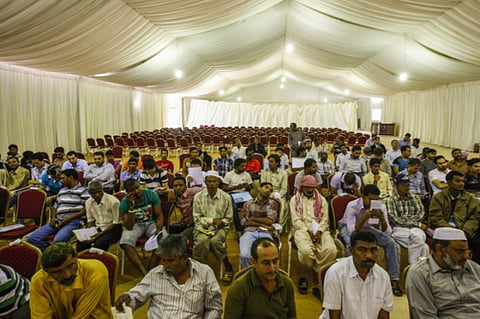Amnesty: The long road ahead
One month after general pardon was announced, many families are still figuring their way out

Dubai: When the Government launched the 60-day amnesty on December 4, thousands of illegal immigrants were expected to rush to the immigration centres to secure exit permits and leave the country with no overstaying fines or labour bans to contend with.
But one month down the line, volunteers coordinating with potential applicants told XPRESS it is not as simple as it seems. The problem according to them lies not with the authorities who have gone all out to ensure smooth and speedy processing of applications, but with the difficult circumstances that many illegal residents find themselves in. Lack of awareness about the country’s laws is also delaying matters.
They said a number of expatriates are in a bind. Burdened by bad debts, credit card loans and legal cases, they cannot leave the country easily. At the same time however, they are in no position to get their status legalised.
MIDDLE CLASS DOMINATES
C.P. Mathew, founder of the NGO Valley of Love (VoL), said unlike 2007 when blue collar workers comprised the majority of applicants, more middle class families are approaching him for help with paperwork this time. “The average profile of the people we are dealing with has vastly changed since 2007. Lost jobs, collapsed businesses, bad loans, credit card defaults, ‘absconders’ – form the bulk of cases now.”
During the 2007 amnesty, around 176,000 workers could legalise their status. But this time, Mathew said legalisation is very difficult.
“VoL receives around 10-15 calls from people every day asking how they can legitimately stay on in the country. They are suffering because they are in debt or have cases against them. They keep asking if the Government will grant mercy if their case is deserving.”
Dubai resident Pastor Sajith Shankar, who provides free legal advice to illegal residents, said: “Many people have huge liabilities and wish to stay back so that they can work and repay their loans. But legalisation of status is not an option for anyone who is listed as absconding or has a court case.”
Shankar said many people find themselves in a mess because they lack awareness about the laws of the land. “They are not criminals, just ill-informed or victims of circumstance. They are cornered by employers, associates or money-lenders who withhold passports and slap cases against them. Employers report employees as absconding to prevent their companies from being blacklisted.”
There are also several families which do not have birth certificates in place for their children. “This is a problem because to get an outpass they must first be registered with their missions. If this is not done within a year of birth, they will have to get the documents from their home country. It’s a long process and can take up to three weeks,” said Mathew.
Among others coming to NGOs for assistance are patients, including those in wheelchairs and with psychiatric problems. “Last time, we helped around 228 people, including five who were hospitalised and three who had undergone surgeries,” said Mathew. “This time we are getting three to four requests from patients every week. We expect the second month to be busier.”
Welfare groups and charity organisations have stepped in to pitch in with funds and help families negotiate with banks to get their claims waived or settled at a discount.
A Parish counsellor from Sharjah said he has been talking to banks on behalf of several families to get their dues waived. “We have 100-150 such cases. One category is of bachelors who lead lavish lifestyles and run into debts. I do not help in such cases. The other type of cases involves families who have run into problems because of job losses or the recession. I have personally approached banks to convince them about the genuineness of such cases and appealed to them to waive or reduce the claims. Good Samaritans pitch in to make these reduced payments.”
Nissar Thalangara, Vice-President of the Kerala Muslim Culture Centre, said he is currently helping 11 families reach an agreement with their banks to get their claims waived or settled at lower amounts. “We have helped clear four cases and are in talks in other cases.”
He said: “Many people do not have copies of their passports and are at sea on what they should do to be able to secure their exit permits. Lack of awareness is a huge stumbling block and that’s one reason why people don’t apply for the amnesty until the last minute.”


